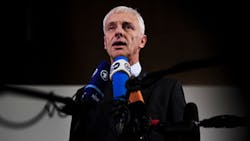Auto Show: VW CEO Apologizes for Scandal
DETROIT — During his first official visit to the United States as Volkswagen CEO, Matthias Mueller apologized Sunday at a media reception on the eve of the Detroit Auto Show for cheating diesel emissions.
“We know that we have let down customers, authorities, regulators and the general public here in America,” Mueller said. “We are — I am — truly sorry for that, and I would like to apologize once again for what went wrong at Volkswagen. … Our most important task in 2016 is to win back trust.
“It’s not only our cars we have to fix. We have to repair our credibility, too.”
The group admitted it installed software in around 11 million diesel cars of its VW, Audi, SEAT and Skoda brands worldwide that helped them evade emissions standards after U.S. regulators discovered the problem. The so-called defeat devices turn on pollution controls when the car is undergoing testing, and off when it is back on the road, allowing it to spew out harmful levels of nitrogen oxide.
The affair severely damaged Volkswagen’s reputation and spawned a host of investigations in several countries. The U.S. government sued the carmaker for installing defeat devices on nearly 600,000 of its VW, Audi and Porsche vehicles sold in America between 2009 and 2015.
The complaint alleges that Volkswagen not only intentionally violated clean-air regulations but also obstructed the investigation by concealing facts and providing misleading information, despite the company’s public pledges of cooperation.
Speaking to journalists after his speech, Mueller insisted that “we are not a criminal brand or group.”
Volkswagen made “huge” technical mistakes, but had “no intention” to deceive the U.S. public or regulators.
Billions in Fines Still Hanging in Balance
Civil penalties in the United States could run well above $20 billion. Volkswagen also faces a costly recall, and at least 650 class-action lawsuits from disgruntled U.S. customers. When asked about the fines, Mueller quipped that people “are overbidding each other every day” in their estimates.
“I am eager to see when the first one is writing about $100 billion,” he told reporters, adding that “we have nothing to say about that.”
Mueller confirmed that he will meet Environmental Protection Agency administrator Gina McCarthy on Wednesday in Washington.
“We will offer some solutions and we will see how the reaction will be,” he said. “We have appropriate technical solutions. We will offer the solutions in very short time.”
Mueller did not want to get into the details of the package, but when asked by AFP about a possible buyback of more than 100,000 affected vehicles in the United States, he said: “That is part of the solution we want to discuss with Mrs. McCarthy.”
However, he said he expects “constructive talks” with McCarthy. He believes the package VW will present is “appropriate,” but said “now we have to see if the EPA sees this in the same way.”
The automaker is also working on an independent claims resolution program “which fits the problem and which is solving the problem.” It will be handled by star lawyer Kenneth Feinberg, known for handling large consumer compensation cases such as the deadly ignition switches used in some General Motors cars.
German newspaper Bild am Sonntag reported Sunday that VW engineers have come up with a technical solution for some 430,000 affected diesel cars. The vehicles would be refitted with a new catalytic converter to meet U.S. emission standards.
The Volkswagen chief was tight-lipped about other scheduled meetings in Washington, and only said that he will meet “a lot of people.”
Mueller also said Volkswagen plans to make an additional $900 million investment in the United States to build a new mid-size SUV. The investment at VW’s Chattanooga plant will create approximately 2,000 jobs, Mueller said, adding that, “the U.S. is and remains a core market for the Volkswagen Group.”
Mueller remained bullish on the outlook for diesel, which is about 30% more efficient than gasoline engines and can help reduce greenhouse gas emissions.
“There will be a big future for diesel engines all over the world,” he said.
By Luc Olinga and Gregor Waschinski
Copyright Agence France-Presse, 2016
About the Author
Agence France-Presse
Copyright Agence France-Presse, 2002-2025. AFP text, photos, graphics and logos shall not be reproduced, published, broadcast, rewritten for broadcast or publication or redistributed directly or indirectly in any medium. AFP shall not be held liable for any delays, inaccuracies, errors or omissions in any AFP content, or for any actions taken in consequence.
